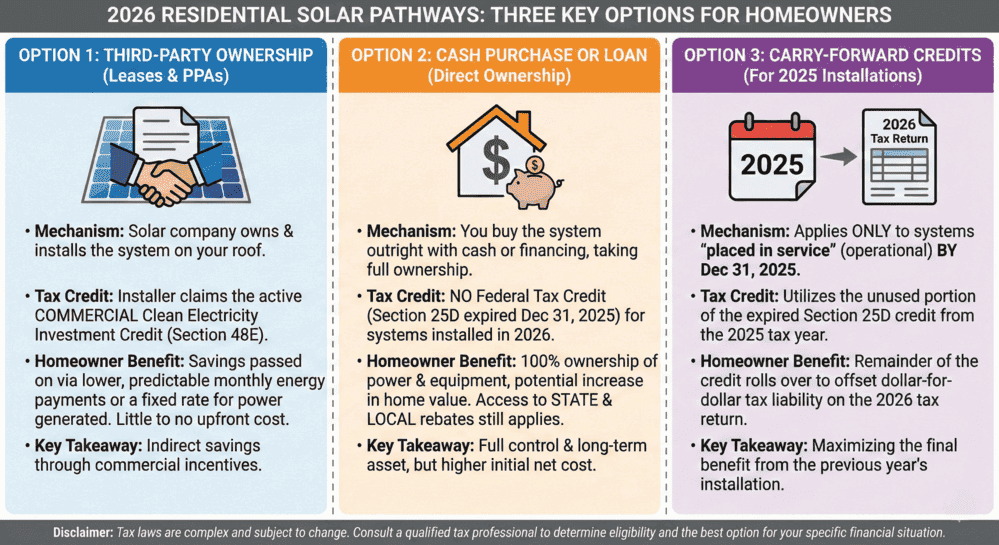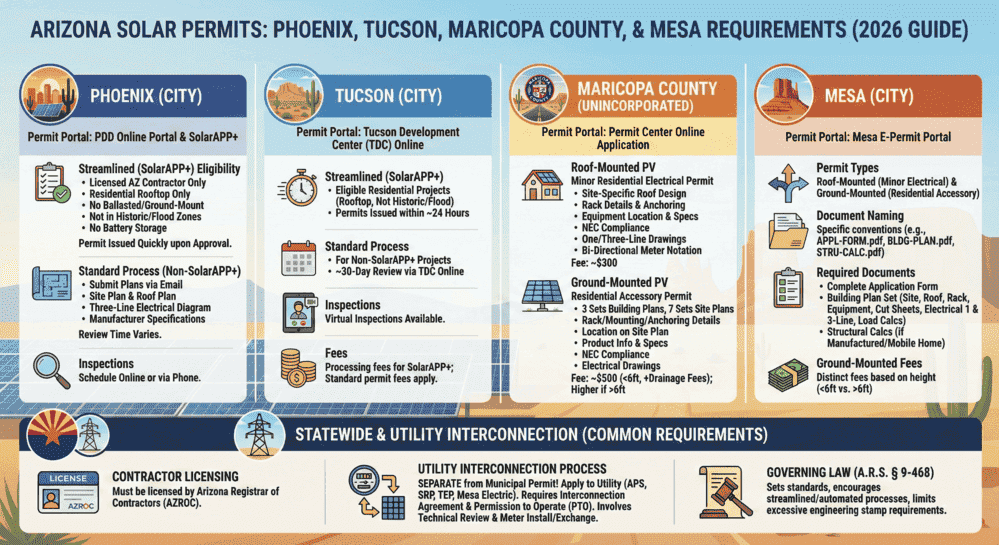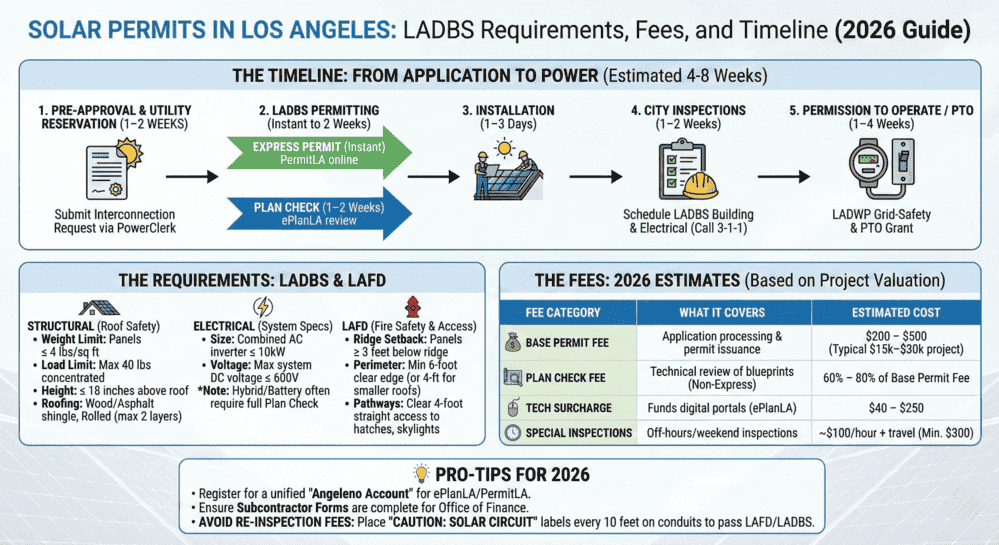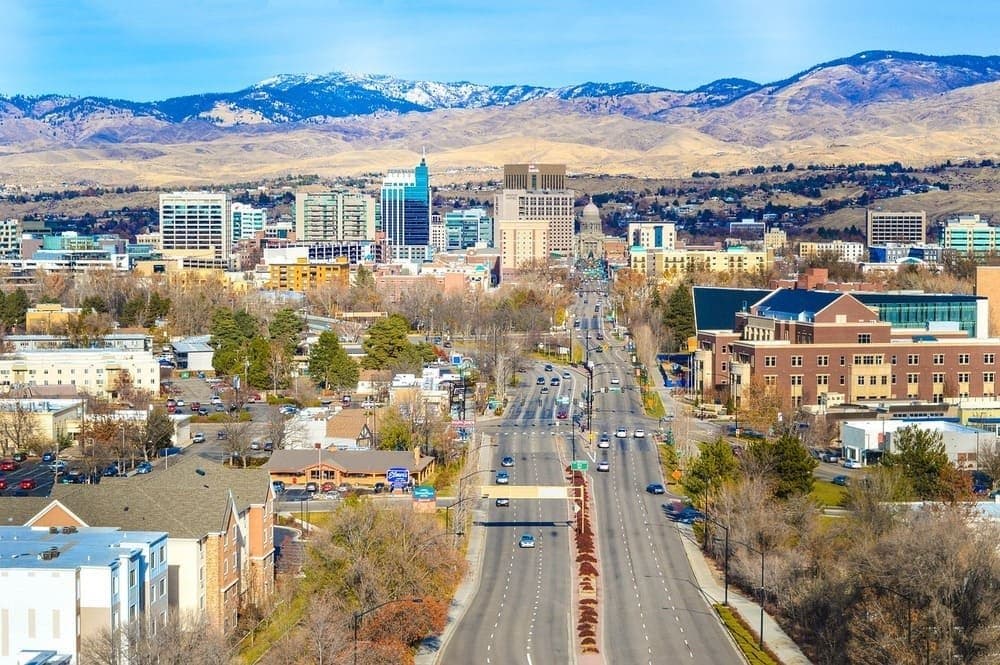Installing solar panels in Idaho requires three primary permits: a building permit, an electrical permit, and a utility interconnection permit. The Idaho solar permitting process involves coordination between your local city or county government, the Idaho Department of Building Safety, and your utility provider (typically Idaho Power). Most residential solar installations in Idaho take 2-8 weeks to receive full permit approval, with total permitting costs ranging from $200 to $800 depending on system size and jurisdiction.
Idaho solar permit requirements include structural plans for building department review, electrical system diagrams for safety compliance, and utility interconnection applications for grid-tied systems. Every jurisdiction in Idaho, from Boise and Meridian to rural counties, enforces specific permitting standards based on local building codes, zoning regulations, and safety protocols. The permitting process follows four key steps: application submission with complete documentation, permit review and approval by local authorities, system installation by licensed professionals, and final inspections before activation.
Solar Permit Solutions specializes in Idaho solar permitting, providing permit-ready design packages, professional engineering stamps, and utility interconnection coordination that ensure compliance with all state and local requirements. Whether you’re planning residential rooftop installation or commercial ground-mount systems, understanding Idaho’s permitting framework prevents costly delays and ensures your solar project meets all regulatory standards from application through final approval. This comprehensive resource breaks down Idaho’s solar permitting requirements, regulatory frameworks, and approval processes to help you successfully navigate your solar installation.

Understanding Idaho’s Solar Permitting Framework
Solar adoption continues accelerating throughout Idaho, driven by abundant sunshine, expansive land availability, and declining equipment costs. According to the World Resources Institute’s solar radiation data, Idaho receives excellent solar potential across most of the state. Property owners recognize solar energy as an economically viable clean energy solution. Before beginning any installation, you must complete specific permitting procedures following established solar permitting best practices.
Solar permitting establishes the legal framework ensuring your installation meets building codes, safety protocols, zoning requirements, and regulatory standards. You’ll secure multiple authorizations from state and local agencies covering building modifications, electrical work, and utility connections. Each Idaho municipality maintains distinct requirements, making location-specific research is critical for your project. For those new to solar technology, our beginner’s guide to solar energy provides foundational knowledge before diving into the permitting process.
Key Regulatory Agencies Governing Solar Projects
Multiple government entities oversee solar permitting in Idaho, each enforcing specific safety and compliance standards. Knowing which agency handles each aspect streamlines your approval process.
Municipal Authorities: Your city or county government serves as your primary permitting contact. Municipal offices establish location-specific requirements based on installation type, property characteristics, and local regulations.
Idaho Department of Building Safety (IDB): This state agency enforces building code compliance and regulates construction standards. The IDB governs structural safety protocols and electrical system requirements. Submit your building, electrical, and inspection applications through this department.
Idaho Public Utilities Commission (IPUC): This commission regulates electric utilities statewide and administers net metering programs. Grid-connected systems require compliance with utility interconnection standards. The IPUC also manages renewable energy incentive programs affecting solar projects.
Federal Regulatory Framework: Federal authorities establish nationwide standards, particularly regarding tax incentives, renewable energy credits, and environmental compliance. The federal Investment Tax Credit (ITC) enables you to claim significant tax deductions based on your installation costs. The National Renewable Energy Laboratory provides extensive research on solar technologies and federal programs supporting renewable energy adoption.
Required Permit Categories for Solar Projects
Secure all necessary authorizations before starting construction. Idaho’s permit requirements mirror other states’ solar installation protocols:
Building Authorization: This permit verifies your structure can accommodate solar equipment safely. Rooftop installations require structural assessment confirming your roof supports the additional weight. Significant structural modifications, including new mounting systems or support frames, trigger building permit requirements. Understanding wind load and snow load analysis is essential for structural compliance.
Electrical Authorization: Solar systems involve complex electrical integration requiring professional oversight. This permit ensures your wiring, components, and connections satisfy safety codes. Local inspectors review your electrical plans, verifying code compliance and professional installation standards. Mastering electrical fundamentals helps you understand the technical requirements.
Zoning Authorization: Zoning codes regulate land use and development within designated areas. Your Idaho location determines whether you need zoning approval. Municipal regulations may establish setback requirements or height restrictions affecting panel placement.
Utility Interconnection Authorization: Grid-connected systems require utility company approval. Idaho Power and other providers maintain specific interconnection standards, including safety inspections and system functionality verification. This authorization ensures grid compatibility and safety compliance. For any system connected to the public grid, your local utility company (like Idaho Power) requires an application and approval to connect to their grid.
Special Circumstance Permits: Unique situations demand additional authorizations. Historic districts or environmentally sensitive areas often require preservation or environmental permits. Consult local authorities to identify any special compliance requirements.
Additional Requirements
HOA Approval: If you are part of a homeowners’ association (HOA), you may need to get approval from them as well. Learn more about how HOA regulations impact solar permit approvals.
Design Plans: You will need to provide detailed plans to the building department, which typically include a site plan, electrical drawings, and structural details. Our residential solar design services ensure your plans meet all technical requirements.
Inspection: After installation, the system will need to be inspected to ensure it was installed correctly and meets all local codes.

Solar Permit Solutions
Skip the Permit Headaches
We design plan sets that pass inspection the first time. Code-compliant, PE-stamped, accepted by AHJs nationwide.
Your Step-by-Step Permitting Journey
Idaho’s solar permitting follows a structured progression. While local variations exist, expect these standard phases:
Initial Planning Phase: Begin by evaluating your site’s solar viability, analyzing roof orientation, shading patterns, and available installation space. Engage a qualified solar contractor to assess project feasibility and estimate costs and returns. Finding qualified installers in Idaho ensures you work with experienced professionals. Solar Permit Solutions specializes in navigating Idaho’s permitting landscape, providing expert permit design services and engineering stamps that ensure your application meets all state and local requirements from the start. For comprehensive learning resources, explore essential books for mastering DIY solar energy.
Application Submission: After confirming feasibility, compile and submit your permit applications. Prepare building plans, electrical schematics, site diagrams, and utility interconnection agreements. Understanding what equipment specification sheets to include prevents application delays. Professional services like Solar Permit Solutions streamline this process by handling complete permit package preparation, ensuring all documentation meets Idaho’s municipal standards and reducing the risk of application rejections or delays. Avoiding common solar permit design mistakes is critical for first-time approval.
Review and Authorization: Municipal reviewers examine your submission and may request modifications to satisfy code requirements. The permitting office might require plan adjustments addressing safety concerns or zoning limitations. Once approved, you receive authorization to proceed. Understanding typical solar permit timelines helps set realistic expectations.
System Inspection: Post-installation inspections verify compliance before system activation. Local building officials or utility inspectors confirm proper installation according to approved plans and safety regulations. Passing inspection authorizes system commissioning.
Processing Timeline and Expenses: Expect permitting completion within several weeks to two months, depending on system complexity and municipal responsiveness. Permit fees vary by installation size and jurisdiction, typically adding several hundred dollars to total project costs.
Municipal Codes and Zoning Requirements
Each Idaho jurisdiction enforces unique regulations affecting solar installations. Zoning ordinances dictate panel placement and installation methods, particularly in urban settings. Expect potential restrictions on panel height or positioning, especially within historic districts or specially zoned areas.
Certain municipalities mandate aesthetic integration standards, requiring panels to complement building architecture. Rural locations typically feature relaxed zoning, though setback requirements and environmental considerations still apply. Understanding solar panel racking systems helps ensure your installation meets both structural and aesthetic requirements.
Grid Connection Procedures
Grid-connected systems require following Idaho Power’s interconnection protocols, the state’s primary utility provider. The interconnection process ensures safe operation, grid protection, and net metering compliance. Net metering programs credit you for surplus electricity your system feeds into the grid. Many homeowners wonder if they’ll need a different meter after going solar, and the answer depends on your utility provider and system configuration. For those comparing processes across utilities, reviewing how to go solar with SDG&E provides valuable insights into utility-specific requirements.
Installation and Permitting Expenses
Total costs depend on system size, installation complexity, and project location. Idaho homeowners typically invest several hundred dollars in permit fees. Installation expenses vary based on system type, complexity, and mounting configuration (ground versus roof-mounted). For those interested in DIY approaches, our guide on building your own home solar power system provides valuable insights, though professional installation is recommended for ensuring code compliance.
Idaho Solar Permit Changes in 2025
Idaho’s permitting process generally proceeds smoothly, but expect potential challenges. Processing delays occur frequently in high-demand areas. Navigating zoning regulations and building codes becomes complex with difficult sites or large-scale installations.
Idaho has strengthened renewable energy support through updated solar policies and permitting procedures. According to the International Energy Agency’s renewable energy report, global solar adoption continues accelerating. Many jurisdictions now implement expedited permitting to facilitate solar adoption. The Union of Concerned Scientists provides comprehensive analysis of renewable energy benefits and policy developments. Monitor ongoing regulatory changes affecting fees, code requirements, or approval processes.
Ensuring Smooth Permit Approval
Partner with experienced solar contractors familiar with Idaho’s permitting landscape to avoid delays and complications. Complete thorough documentation, address zoning concerns proactively, and maintain open communication with regulatory authorities to expedite approval and minimize obstacles. Working with NABCEP-certified professionals ensures your installer has verified expertise. Solar Permit Solutions offers comprehensive permitting support for Idaho solar projects, managing everything from initial permit applications and utility interconnection paperwork to engineering stamps and PTO processing, allowing you to focus on your installation while experts handle the regulatory requirements.
What Financial Incentives Are Available for Idaho Solar Installations?
Idaho property owners benefit from multiple incentive programs that significantly reduce solar investment costs. Three major programs deliver the most substantial savings, though the most valuable incentive faces an imminent deadline.
Residential Clean Energy Credit Overview
The Residential Clean Energy Credit, previously called the federal investment tax credit (ITC), delivers a 30% cost reduction for complete solar installations. This incentive covers your total project expenses, encompassing equipment purchases, professional installation, permitting fees, and applicable sales taxes.
This credit expires permanently after December 31, 2025. Following President Trump’s July 4, 2025 legislative action, the residential solar tax credit terminates completely, effective January 1, 2026, nearly ten years earlier than initially scheduled. Solar installations typically require multiple months from initial consultation through final activation, making immediate action essential for homeowners wanting to capture these savings.
Idaho’s average 5 kW solar system costs approximately $14,487. Applying the 30% credit reduces your net investment to $10,141, yielding $4,346 in savings.
Claim this incentive as a credit against your federal tax liability when filing annual returns. Important qualifying criteria: You must purchase your system outright via cash payment or solar financing. Leased systems disqualify you from this benefit.
You require sufficient tax liability to utilize the credit, though unused portions carry forward annually according to tax experts . The IRS establishes no expiration for credit rollovers, theoretically allowing indefinite carryover under current regulations. However, Tax Form 5695 likely becomes obsolete after 2025, potentially eliminating this filing mechanism. Consult qualified tax advisors for personalized guidance.
Claiming the ITC in Idaho
Securing the ITC requires straightforward steps:
- Download IRS form 5695
- Complete the form using installer-provided documentation
- Include the finished form with your tax filing
Critical deadline: Your installation must reach completion by December 31, 2025, for credit eligibility.
Idaho Residential Alternative Energy Tax Deduction
Following system activation, you reduce your taxable income by deducting a portion of installation costs across four consecutive years. Annual deductions cannot exceed $5,000 and follow this distribution:
- First year: 40% of total system cost
- Second year: 20% of total system cost
- Third year: 20% of total system cost
- Fourth year: 20% of total system cost
Idaho Solar Tax Exemptions & Net Metering
Are Solar Systems Exempt from Idaho Property or Sales Taxes?
Idaho currently provides no property tax exemptions or sales tax exclusions for residential solar installations.
Does Idaho Provide Net Metering for Solar Systems?
Idaho’s net metering availability depends entirely on your utility provider. Three major utilities serve Idaho with distinct compensation policies:
Avista Utilities
Avista customers installing grid-connected systems under 100 kW qualify for net metering, among the most beneficial solar compensation structures available. This program credits your account when your solar panels generate surplus electricity exported to the utility grid.
During periods without solar production, you draw power from the grid using accumulated credits to offset consumption charges. Net metering can eliminate or drastically reduce monthly electric bills for solar customers. Credit accumulation has limitations: all unused credits from the preceding 12 months expire annually on March 31st.
Rocky Mountain Power
Rocky Mountain Power officially transitioned from net metering to net billing in November 2020, though residential customers experienced minimal impact. Residential systems under 25 kW currently receive full retail electricity rate compensation for exported energy, functionally equivalent to traditional net metering. Unused credits expire annually on March 31st for most residential customers.
Rocky Mountain Power filed Schedule 136 modifications with the Idaho Public Utilities Commission (IPUC) in February 2025, proposing substantial compensation reductions. The proposed changes would reduce export rates from current retail prices (approximately $0.09-$0.10 per kWh) to roughly $0.04 per kWh based on time-differentiated rates that would be updated annually. The utility originally proposed an October 1, 2025, implementation date.
As of November 2025, these changes remain under IPUC review with no final decision announced. Schedule 136 customers continue receiving retail rate compensation for exported energy until the commission issues a ruling. Customers can monitor the case status and submit public comments at www.puc.idaho.gov (Case No. PAC-E-25-02).
Idaho Power
Idaho Power eliminated net metering in January 2024, implementing net billing that substantially reduces credit values and diminishes bill savings potential for solar customers.
California recently experienced similar policy shifts: Export credits are now calculated based on avoided-cost rates rather than retail electricity pricing. According to Sierra Club analysis, Idaho Power’s net billing transition decreased solar export compensation approximately 32%.
Systems installed or purchased by December 20, 2019, maintain grandfathered net metering status through December 20, 2045. All other customers currently receive reduced compensation, making battery storage increasingly attractive for maximizing solar value.
What Battery Storage Incentives Exist in Idaho?
Idaho offers no state-level battery incentive programs. However, all battery systems exceeding 3 kWh capacity qualify for the 30% federal tax credit. Battery installations enhance energy independence and deliver backup power protection during Idaho blackouts.
Idaho Power customers should seriously evaluate battery integration with solar installations. Battery storage enables you to capture excess solar generation for later consumption rather than exporting low-value electricity to the grid.
Rocky Mountain Power customers should also consider battery additions, particularly given pending Schedule 136 changes. If installing batteries, verify eligibility for Rocky Mountain Power’s Wattsmart Battery Program, a four-year incentive initiative rewarding customers who install qualifying battery systems and authorize Rocky Mountain Power to access stored energy during peak demand periods.
The program compensation structure includes:
- Initial incentive: $400 per kW of installed storage capacity
- Recurring annual participation payment: $15 per kW
Conclusion
Navigating Idaho’s solar permitting process requires understanding multiple regulatory layers, from local building codes to utility interconnection requirements. While the process may seem complex, proper preparation and documentation ensure smooth approval and timely installation. According to REN21’s Global Status Report, renewable energy adoption continues growing worldwide, and Idaho’s commitment to renewable energy reflects this trend, with many jurisdictions streamlining their permitting procedures to accelerate solar adoption across the state.
Success in solar permitting hinges on three critical factors: thorough site assessment, complete and accurate documentation, and compliance with all local, state, and utility regulations. Working with experienced professionals who understand Idaho’s specific requirements dramatically reduces delays and prevents costly mistakes. From securing building and electrical permits to coordinating utility interconnection and final inspections, each step demands attention to detail and regulatory knowledge.
Whether you’re a homeowner pursuing residential solar or a business planning commercial installation, Idaho’s solar permitting framework protects your investment by ensuring safe, code-compliant systems. The upfront effort invested in proper permitting pays dividends through faster approvals, successful inspections, and seamless grid connection. For homeowners exploring similar processes in other states, reviewing Arizona’s solar permitting requirements provides valuable comparative insights. Solar Permit Solutions stands ready to guide Idaho property owners through every permitting phase, delivering expert permit design, engineering stamps, and complete regulatory compliance support that transforms complex requirements into straightforward processes. As solar technology advances and environmental regulations evolve, staying informed about proper disposal and lifecycle management becomes increasingly important.
FAQs
Skip the Permit Headaches
We design plan sets that pass inspection the first time. Code-compliant, PE-stamped, accepted by AHJs nationwide.
Frequently Asked Questions
Yes, solar panel installation in Idaho requires multiple permits regardless of system size. You'll need building permits to verify structural integrity, electrical permits for safe wiring and connections, and utility interconnection permits for grid-tied systems. Each Idaho municipality enforces its own permitting requirements, so your specific location determines the exact permits needed. Even small residential systems require proper authorization to ensure compliance with safety codes and zoning regulations. Skipping the permitting process can result in fines, forced system removal, or denied utility interconnection.
Solar permit approval in Idaho typically takes 2-8 weeks, depending on your jurisdiction and application completeness. Urban areas like Boise or Meridian may process permits faster due to established solar permitting protocols, while rural counties might experience longer timelines. Simple residential rooftop installations generally receive quicker approval than complex ground-mount or commercial systems. Incomplete applications, missing documentation, or required plan revisions can extend the timeline significantly. Submitting thorough, professionally prepared permit packages with accurate engineering plans and complete site documentation accelerates the review process and minimizes delays.
Solar permit fees in Idaho range from $200 to $800 for residential installations, varying by system size and local jurisdiction. Building permit fees typically cost $100-$300, electrical permits run $50-$200, and utility interconnection applications add $50-$300. Larger commercial systems incur higher fees, sometimes exceeding $1,000 depending on system capacity. Some Idaho counties charge flat permit fees, while others calculate costs based on system value or kilowatt capacity. These permit fees represent a small fraction of total installation costs but are mandatory expenses that cannot be avoided.
Idaho solar permit applications require structural engineering plans stamped by a licensed PE, electrical single-line diagrams showing system specifications, site plans indicating panel placement and property boundaries, equipment spec sheets for panels and inverters, and utility interconnection applications. Building departments may request additional documentation, including roof load calculations, shading analysis, or HOA approval letters, depending on your jurisdiction.
Both homeowners and licensed contractors can apply for solar permits in Idaho. However, most jurisdictions require a licensed electrical contractor's signature on electrical permit applications, even if the homeowner submits the paperwork. While you can technically handle the permitting yourself, professional installers and permitting services like Solar Permit Solutions typically submit applications to ensure compliance with Idaho's complex code requirements and avoid costly rejections or resubmissions.
SPS Editorial Team
Solar Permit Solutions
Solar Permit Solutions provides professional solar permit design services for residential, commercial, and off-grid installations across all 50 states. Our team ensures permit-ready plan sets delivered fast.
Related Articles

Section 25D Expiration: Homeowner Options In 2026
The Section 25D Residential Clean Energy Credit, which covered 30% of residentia...

Solar Permits In Arizona: Phoenix, Tucson, Maricopa County, And Mesa Requirements (2026 Guide)
Arizona solar permitting at a glance: Arizona HB2301 now requires every municipa...

Solar Permits in Los Angeles: LADBS Requirements, Fees, and Timeline (2026 Guide)
Quick Answer: Solar permits in Los Angeles are issued by LADBS and require LAFD ...
